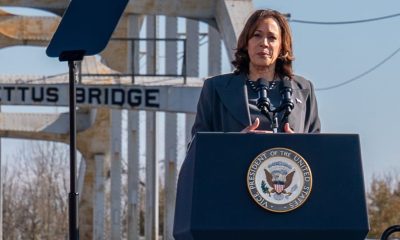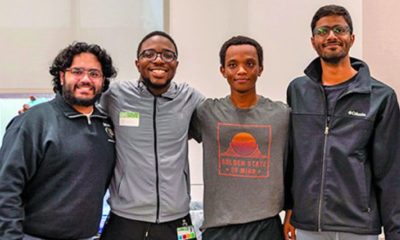Black History
13-Year-Old Girl Becomes Youngest Person Accepted into Medical School
Thirteen-year-old Alena Analeigh Wicker received an early acceptance to the University of Alabama, Birmingham’s Heersink School of Medicine under its Burroughs Wellcome Scholars Early Assurance Program. The program partners with Black schools in Alabama to offer students early acceptance as they plan to enter medical school.

From Black Doctor.org
Getting into medical school is no small feat, but imagine doing it at just 13 years old. While most 13-year-olds are heading to high school, Alena Analeigh Wicker has made history by becoming the youngest Black person – and the youngest person ever – to get accepted into medical school.
“Today I’m just grateful. I graduated high school last year at 12 years old and here I am one year later I’ve been accepted into Med School at 13,” Wicker wrote on Instagram last week. “Statistics would have said I never would have made it. A little Black girl adopted from Fontana, California. I’ve worked so hard to reach my goals and live my dreams.”
She received an early acceptance to the University of Alabama, Birmingham’s Heersink School of Medicine under its Burroughs Wellcome Scholars Early Assurance Program. The program partners with Black schools in Alabama to offer students early acceptance as they plan to enter medical school.
Wicker, who is currently a junior at Arizona State, has always been ahead of her time.
After graduating high school, she was able to complete more than half of her undergraduate requirements at Arizona State University (ASU) and Oakwood University in just one year.
Wicker grew up loving to build things and previously had dreams of building robots for NASA. However, after a trip to Jordan with The Brown STEM Girl foundation, she fell in love with biology and realized that wasn’t the route she wanted to go.
“It actually took one class in engineering, for me to say this is kind of not where I wanted to go,” she told 12 News.” I think viral immunology really came from my passion for volunteering and going out there engaging with the world.”
Her goal?
“What I want from healthcare is to really show these underrepresented communities that we can help, that we can find cures for these viruses,” she added.
Activism
Oakland Post: Week of April 24 – 30, 2024
The printed Weekly Edition of the Oakland Post: Week of April 24 – 30, 2024

To enlarge your view of this issue, use the slider, magnifying glass icon or full page icon in the lower right corner of the browser window. ![]()
Activism
Oakland Post: Week of April 17 – 23, 2024
The printed Weekly Edition of the Oakland Post: Week of April 17 – 23, 2024

To enlarge your view of this issue, use the slider, magnifying glass icon or full page icon in the lower right corner of the browser window. ![]()
Black History
Matthew Henson: Explorer Extraordinaire
Matthew Henson, a trailblazing explorer who overcame countless obstacles to leave an incredible mark on history. Born on August 8, 1866, in Charles County, Maryland, his journey is a testament to the power of determination and the spirit of adventure.

By Tamara Shiloh
Matthew Henson, a trailblazing explorer who overcame countless obstacles to leave an incredible mark on history. Born on August 8, 1866, in Charles County, Maryland, his journey is a testament to the power of determination and the spirit of adventure.
Henson’s life began amidst the backdrop of post-Civil War America, where opportunities for African Americans were scarce. From a young age, he possessed an insatiable curiosity about the world beyond his small town. At the age of 12, he embarked on a journey that would change the course of his life forever when he joined a merchant ship as a cabin boy.
His most famous expedition was his journey to the Arctic with renowned explorer Robert E. Peary. In 1887, Henson joined Peary’s crew as a seaman and quickly proved himself to be invaluable with his skills as a navigator and craftsman. Over the course of several expeditions, Matthew endured extreme cold, treacherous terrain, and grueling conditions as he and Peary sought to reach the elusive North Pole.
In 1908–09, Peary set out on his eighth attempt to reach the North Pole. It was a big expedition, with Peary planning to leave supplies along the way. When he and Henson boarded their ship, the Roosevelt, leaving Greenland on August 18, 1909, they were joined by a large group. This included 22 Inuit men, 17 Inuit women, 10 children, 246 dogs, 70 tons of whale meat, blubber from 50 walruses, hunting gear, and tons of coal.
In February, Henson and Peary left their anchored ship at Ellesmere Island’s Cape Sheridan, along with the Inuit men and 130 dogs. They worked together to set up a trail and supplies along the way to the Pole.
Peary picked Henson and four Inuit people to join him in the final push to the Pole. However, before they reached their destination, Peary couldn’t walk anymore and had to ride in a dog sled. He sent Henson ahead to scout the way. In a later interview with a newspaper, Henson recalled being in the lead and realizing they had gone too far. The group turned back, and Henson noticed his footprints helped guide them to their destination. At that location, Henson planted the American flag.
Henson’s legacy extends far beyond his expeditions to the Arctic. He shattered racial barriers in the world of exploration and inspired countless individuals, regardless of race, to dream big and pursue their passions. In 1937, he was finally recognized for his achievements when he was inducted into The Explorers Club, an organization dedicated to promoting scientific exploration and field research.
Matthew Henson died in the Bronx, New York, on March 9, 1955, at the age of 88.
-

 Activism4 weeks ago
Activism4 weeks agoOakland Post: Week of March 27 – April 2, 2024
-

 #NNPA BlackPress4 weeks ago
#NNPA BlackPress4 weeks agoBeloved Actor and Activist Louis Cameron Gossett Jr. Dies at 87
-

 Community1 week ago
Community1 week agoFinancial Assistance Bill for Descendants of Enslaved Persons to Help Them Purchase, Own, or Maintain a Home
-

 Activism3 weeks ago
Activism3 weeks agoOakland Post: Week of April 3 – 6, 2024
-

 Business2 weeks ago
Business2 weeks agoV.P. Kamala Harris: Americans With Criminal Records Will Soon Be Eligible for SBA Loans
-

 Activism2 weeks ago
Activism2 weeks agoOakland Post: Week of April 10 – 16, 2024
-

 Community2 weeks ago
Community2 weeks agoAG Bonta Says Oakland School Leaders Should Comply with State Laws to Avoid ‘Disparate Harm’ When Closing or Merging Schools
-

 Community7 days ago
Community7 days agoOakland WNBA Player to be Inducted Into Hall of Fame






















































